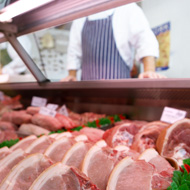'High level' of resistant E. coli found in retail meat

"...insufficient resources are being put into the surveillance of antibiotic resistance in farm animals and retail meat"
A new study has shown high levels of antibiotic resistant E. coli bacteria in meat samples from UK supermarkets. The Cambridge scientist who led the research says not enough resources are being put into the surveillance of antibiotic resistance in farm animals and meat.
Researchers from Cambridge University studied 189 pork and poultry samples of UK origin from the seven leading supermarkets - ASDA, Aldi, Coop, Morrisons, Sainsbury's, Tesco and Waitrose.
The study was commissioned by the Alliance to Save our Antibiotics and is said to be the first to analyse UK-origin retail meat for resistance to a range of antibiotics used to treat E. coli infections in humans.
Researchers found almost a quarter of chicken samples (24 per cent) tested positive for ESBL E. coli, which is resistant to critically important modern cephalosporin antibiotics, used in the treatment of life threatening blood poisoning in humans.
Over half of the E. coli found on pork and poultry samples were resistant to the antibiotic trimethoprim (51 per cent), which is used to treat more than 50 per cent of human lower urinary tract infections. In addition, 19 per cent of the E. coli were resistant to gentamicin, a very important human drug used for treating more serious upper urinary tract infections.
Lead author Dr Mark Holmes, from Cambridge University, commented: "I’m concerned that insufficient resources are being put into the surveillance of antibiotic resistance in farm animals and retail meat. We don’t know if these levels are rising or falling in the absence of an effective monitoring system.
"These results highlight the need for improvements in antibiotic stewardship in veterinary medicine. While some progress has been made we must not be complacent as it may take many years before we see significant reductions in the numbers of antibiotic-resistant bacteria found in farms."



 The latest
The latest